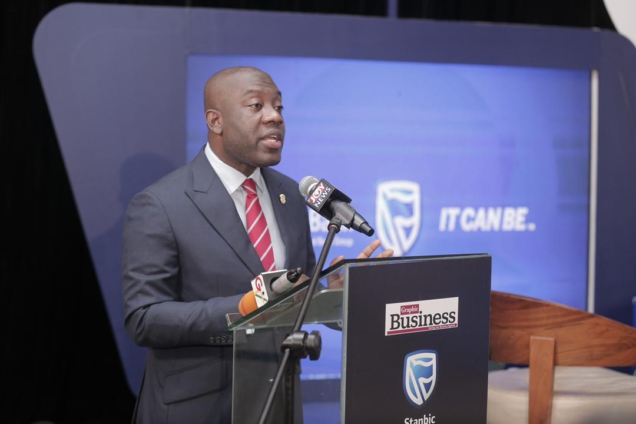Information Minister, Kojo Oppong Nkrumah has highlighted the key role played by the mass media and marketing communications in the country’s quest to achieve economic growth post-Covid-19.
Speaking at the Graphic Business-Stanbic Bank Breakfast Meeting on Tuesday, Mr Oppong Nkrumah tasked the media to preach the importance of supporting the government in these critical times, particularly, those who refuse to pay taxes.
According to him, government is executing some policies to revamp the economy, however, it cannot achieve its objectives if the public fails to contribute its quota.
“Government will not even make an effort to pretend it is a walk in the park. They require difficult, unpopular decisions and a lot of public goodwill if they are to succeed.
“You [media] have to convince the 33,000 engineers, lawyers accountants and other professionals who are not known to the Tax database, yet demand that you fix everything around at a go, that they have to pay their due if we are to rake in the outstanding 10% of GDP that is not coming to the national treasury and reduce borrowing some more,” he said.
On government’s measures against Covid-19, the Minister charged the media to propagate the need for citizens to get vaccinated and abide by the safety protocols in order for the country to win the fight against the pandemic.
“In a robust media and democratic culture like ours, You have to convince the citizen who will not protect himself and could die if not vaccinated, yet who rightly holds you to live up to the full text of the law, that, you have to do all you can to procure a vaccine to protect his life?
“You have to convince the very person who refuses to wear the mask that the economy needs to be re-opened so he doesn’t go hungry,” Mr Oppong Nkrumah said.
Whilst recognizing that the media needs support to survive the effects of the Covid-19 pandemic, Mr Oppong-Nkrumah asked the media to deliver the right information that will make the country attractive to investors.
“How we report the aims the strategies and the evaluation of policy interventions can fuel or distort the picture of and for the general public. And in return becomes the new stimulus of how the economic actors, the general public, and even the governments further act in this recovery cycle.
“For any set of interventions to be successful as has been observed, it must gain the goodwill and support of the people,” he said.
Latest Stories
-
We expect significant reduction in prices of petroleum products in coming weeks – CEO AOMC
3 mins -
Betway Africa offers once-in-a-lifetime ‘Play-on-the-Pitch’ experience at Emirates Stadium
13 mins -
I coined the term ‘hype man’ in Ghana – Merqury Quaye
18 mins -
Vasseur questions ‘strange momentum’ of Formula One race director change
40 mins -
“I am disappointed in Kojo Manuel” – Merqury Quaye on “no tie” comment
40 mins -
Nana Kwame Bediako; The beacon of unity
43 mins -
Western Region: NDC youth wing embarks on phase 2 of ‘retail campaign’
1 hour -
Action Chapel International holds annual Impact Convention in November
1 hour -
Jana Foundation urges young women to take up leadership roles
1 hour -
All set for Joy FM Prayer Summit for Peace 2024
1 hour -
Managing Prediabetes with the Help of a Dietitian
2 hours -
Joy FM listeners criticise Achiase Commanding Officer’s election comment
2 hours -
Legal Aid Commission employees threaten strike over poor working conditions
2 hours -
Ghana ranked 7th globally as biggest beneficiary of World Bank funding
2 hours -
IMF board to disburse $360m to Ghana in December after third review
2 hours

